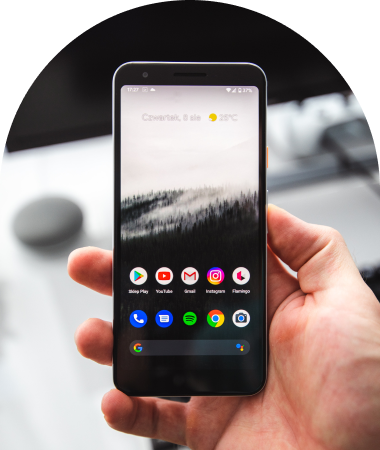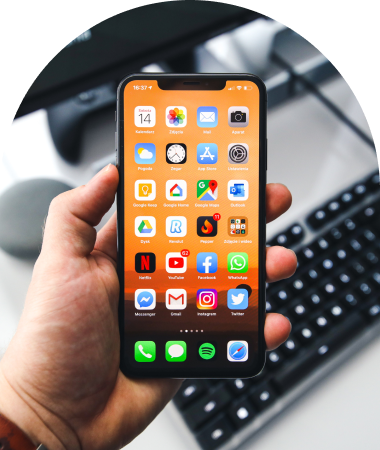Mobile Apps
What is a Mobile App?
A Mobile App is special software, optimized for smartphones and tablets. Apps enable quick access to data and documents. This saves time and speeds up the work process significantly, when used in business.
What types of Mobile Apps do we offer?
We offer mobile applications for iOS and Android as well as cross-platform solutions.

- Android
We develop native Android apps for smartphones and tablets in the programming languages Java and Kotlin. These are the standard languages for this platform.
Offering your customers a native Android app, you make your idea accessible to a wide audience, because almost 70% of all mobile devices in the world use Android.
So regardless of whether your business is aimed at the national or global market, developing an Android Mobile App is always a good investment.

Learn more about Android Apps

- iOS
Developing native iOS apps for iPhones and iPads, we rely on the SWIFT programming language. Apple recommends the SWIFT as a new alternative to Objective-C. According to Apple, SWIFT is 2.6 times faster than its predecessor.
Developing apps under this platform offers your company various advantages, such as optimal data protection, solvent customers and better app optimization due to a limited number of iOS devices.
Learn more about iOS Apps

- Cross-Platform
We use the programming languages Flutter and React Native for developing cross-platform and hybrid apps.
With the cross-platform approach, your company saves money because only one version of the app needs to be developed. This version runs then on both Android and iOS devices.
You also benefit from the shorter development time. So you can bring the app to market faster.


Learn more about Cross-Platform Apps
We support you in choosing the right platform for your Mobile App
Advantages of using Mobile Apps in companies
Mobile applications bring several advantages for companies.
This includes:
The number of smartphone users is constantly increasing worldwide. It is currently estimated that 6.5 billion people own a smartphone. In 2027, the number is expected to be almost 7.7 billion. These are potential customers for your company. Accessing this group of customers via a Mobile App is much easier than via classic sales channels.
The number of app downloads increases worldwide steadily. Last year, users downloaded around 230 billion apps. This is a growth of over 63% compared to 2016. An app is simple to use. Because of that it is easier for you to establish direct contact with your customers via apps. This way you can provide your customers with important information immediately, attracting the attention of the target group and building so a brand step by step.
94% of people use their smartphone every day. This makes the app an excellent advertising channel. Once users have installed your app, you can send targeted advertising messages directly to your potential customers, all that with minimal financial outlay. This not only minimizes your advertising expenses, but also increases the efficiency of your marketing.
Targeted advertising messages also mean that your company does not have to use external providers for acquisition. So you keep control over your data security.
When customers use your app, they are more likely to buy your products, because buying via an app is fast and easy. This makes the apps the most popular sales channels. So by offering your customers an app, you increase your company’s sales.
Your app is your own sales channel. You don’t need to pay sales commission to agents for customers when they found to you through the app. This allows you to maximize profits without reducing quality in sales.
We develop an app concept for you so that your company can benefit from these advantages in the best possible way
What are the development methods for Mobile Apps?
There are two approaches to Mobile App development –
development with an app builder and individual development.
01
Development with app builder
The development of Mobile Apps with app builders is based on designer tools such as Webflow, Scapic, Makerpad or on flexible low-code frameworks such as Buildfire, Kissflow, Mendix.
The constructors and frameworks provide a graphical interface for integrating functions and ready made templates that can be used with a drag and drop method.
Benefits of developing with app builder
- Lower investment costs
- Faster completion
- Requires little technical knowledge
Disadvantages of developing with app builder
- Limited functionality
- Third-party advertising in the app
- Slow user interface
- Risk of hacker attacks because hackers know app builder vulnerabilities
02
Individual Development
In the case of individual development, the Mobile App is developed according to customer specifications.
Advantages of individual development
- Functions meet exactly the customer requirements
- Complete hardware support of the end device such as camera, fingerprint scanner, Bluetooth, GPS, graphics processor, etc.
- High performance
- Low resource consumption
- Easy scalability
- Automation of routine development tasks
- Integration into the company’s software landscape (ERP, CRM, website, etc.)
- Multi-factor authentication, encryption and other security measures
Disadvantages of individual development
- Higher investment
- Longer development time
We help you to find the best development method
for your specific project
What should be considered when developing a Mobile App?
The most important things to consider when developing a Mobile App are:
Energy Optimization
Energy optimization is one of the most important challenges when programming a Mobile App, because low battery consumption brings a significant competitive advantage.
Screen Resolution
Different smartphone models use different screen resolutions. When developing an app, it should be ensured that the application works perfectly on all end devices.
Privacy Policy
Apple and Google have different requirements for processing personal user data. Programming the apps, we comply with all platform rules for data collecting, processing and storage.
Offline Mode
Programming a Mobile App, an offline mode should be provided. This allows users to use the app even if their network signal is weak or they don’t have any internet connection at all.
Data Synchronization
To deliver an optimal user experience, synchronization between the web
and mobile versions of the application is important.
App Store Design
An app must be designed in accordance with the app store guidelines. This includes a good app description, app banner, screenshots and other information about
the application.
What are the steps in Mobile App development?
The individual development of a mobile application takes eight steps:
In the first step, we formulate the customer requirement, define the target group and their goals, analyze the market and the competition and think about the monetization and other financing options.
As soon as the basics are clear, we create a requirements catalog in the form of an implementation concept. The concept records in detail which functions are required and which technologies are to use. In addition, we define the most important project indicators (KPIs) and delegate the tasks to the right professionals.
A software architect or an experienced developer defines the structure of the application.
He finds the best way to process data within the application so that defined project goals are achieved.
We design a simplified form of the user interface using sketches and wireframes.
With the help of a workflow model we visualize then all transitions and interactions in the Mobile App.
The workflow model simplifies even complex systems. This can reduce the number of clicks in the application significantly, resulting in a better user experience.
A designer creates a style guide, a design concept for the app based on the sketches and wireframes. The goal is to achieve a harmonious combination of shapes, lines, colors, fonts and buttons. We develop an interactive prototype to test the requirements and make changes if necessary.
Now we write the code for the user interface (Front-End) and the server logic (Back-End), integrating external services if required.
During programming, we rely on agile development, according to SCRUM, optimizing performance and processes.
Once the programming is completed, the app is tested by QA specialists for functionality, compatibility, usability (UX/UI) and performance. If errors are discovered, we document and forward them back to development for rework.
The Back-End software is installed on the production server.
In compliance with Apple and Google guidelines, the app will be published in the app stores.
We constantly monitor user behavior and app functionality, so that we can intervene immediately if necessary.
We are the right partner for your company
in every project phase
How much does a Mobile App cost?
To calculate the price of Mobile App development, we ask you the following questions:
- Do you want a native or a hybrid app?
- Is the app more complex, so that it has to communicate with a database server (Backend)?
- Which functions should your app have?
- Which third-party services should be connected?
- Should the Mobile App have an individual UX design?
- Is the app intended only for the customer or also for the company’s employees?
- When do you need the Mobile App?
Once all questions have been answered in detail,
we will calculate the estimated cost

Why is senapsa the right partner for you?
We are the right partner for all digitalization tasks, because of
We have many years of extensive project experience. We implement both simple and complex solutions for different industries and areas of application.
We follow your specifications and wishes. You get exactly the solution you need and ordered, with all settings and functions included.
We deliver the product in your Corporate Design so that your customers and employees recognize your brand.
We work with a well-established team. We cover the complete development life cycle, from the idea and market analysis to implementation and Go Live. You receive the entire project from us.
We divide the project into individual development phases, which you can follow easily and conveniently. This gives you the opportunity to monitor and control the entire development process.
We ensure a perfect execution at all times. Even after completion, we are there for you, so that your product works as long as you use it.